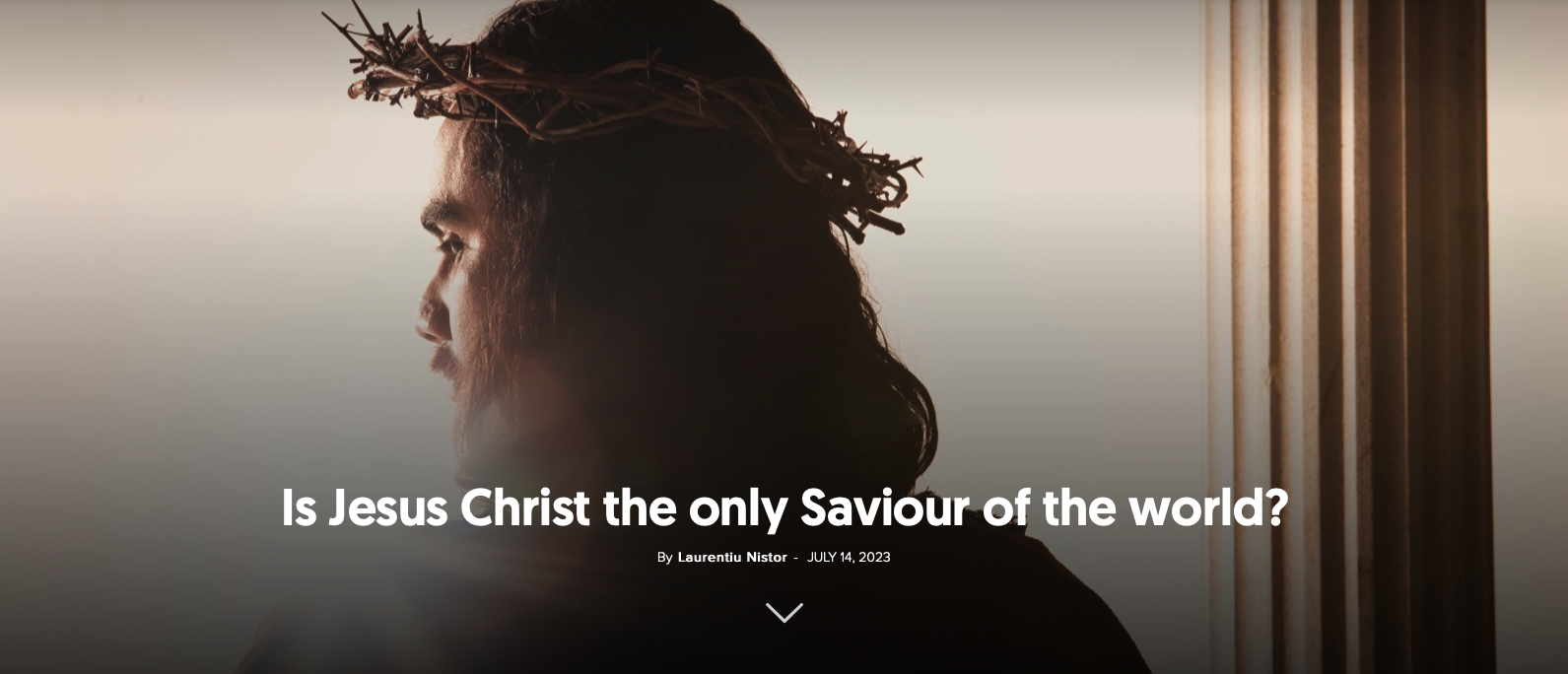Who was Jesus really? While His historical existence is no longer questioned, many people believe that He was at best an exceptional personality of His time, a reformer whom His disciples later transformed into a deity. Why is neo-atheism concerned with promoting such a Jesus, and why is He nothing more than a new form of doubt?
Gabriel Liiceanu’s book, “What Does God Think? A Little Theology,” did not, as expected, create a major storm in our small glass of (cold) water. Praised by some, contested by others, the book attempts to redraw the portrait of Jesus in a personal manner, based solely on rational grounds. It is commendable how an atheist can speak about the uniqueness of Jesus, His astonishing character, and the immense richness of love He left to our world. The beauty of Jesus captivates the reader. The charm of His goodness and His genius is evident. The author seems to have developed a passion for this key figure in world history, defending Him with the dedication of an apologist against an increasingly rational and unbelieving world, a world with which, paradoxically, the author himself identifies.
Nevertheless, we must admit that the author keeps the promise he makes in the title. The book contains only “a little theology.” Instead, we have a lot of philosophy, unexpectedly so for a book about Jesus and His Gospel, which, for the elite of contemporary Greek philosophers, was “madness.”
The title of the book is a satire inspired by the Romanian author Ion Luca Caragiale, and God is a projection of our frightened minds, scared of the idea of death and non-existence. In a sense, the book resembles Arghezi’s psalms and his desperate cry: “I want to touch you and scream: ‘You exist!’” But Liiceanu doesn’t go that far. He lacks the courage for such a prayer. Somehow, he seems convinced of what is and what is not, yet he cannot separate himself from his fascination with Jesus. And this fascination compels him to create Him.
Who are you, Lord?
The knowledge of Jesus Christ remains to this day an act of faith, both for believers and atheists.
Although it seems that His historicity is no longer questioned by the majority of our contemporaries, His way of being, the claim to be the Son of God, and the reasoning behind His life and teachings are for all those who approach Him an act of faith.
We either believe that He was who He claimed to be—the Son of God—or we believe less: “the greatest seducer in the history of mankind.”[1]
“My Jesus,” as Mr. Liiceanu puts it, is not born of the Father, but the Father is born of Jesus. Liiceanu states this very clearly: “In writing, I have constantly observed Jesus, marvelling at how such a being could have appeared and telling myself that, in order to explain Him, we had to invent a unique Father, whom we could only call God.”[2]
This Jesus, astonishing and fascinating even for someone who doesn’t accept Judeo-Christian theological dogmas or the existence of supernatural elements in His life and activities, “affirming with all strength that He is, without being, what He claimed to be, […] became what He claimed.”[3] In other words, Jesus’ complete consistency with His own words caused Him to be regarded as more than an ordinary man, but rather as divine. The author has only words of praise for this Jesus: He is “mankind’s greatest specimen,” “He is divine, the most divine, because [He is] unparalleled among all men.”[4]
In this world of uncertainty and constant change, Jesus remains unchanged. What He teaches us is an unchanging truth, it remains definitive. That’s why I believe in Him. I can trust in His truth because it is God’s truth.
However, we are left with an obvious dilemma: how is it possible for such a man, with perfect moral qualities, to claim to be what he was not in reality? Mr. Liiceanu resolves this dilemma by invoking an unexpected concept—the “white lie,” a lie that cannot be morally culpable and instead of harming us, has done us good. That’s why the author asks: “Why couldn’t one of us, concerned only with others, rise to that state of absolute exceptionality that would enable us to find the path through which, instead of supreme suffering, we would receive the placebo of our salvation?”[5]
Gabriel Liiceanu chooses his words very carefully to convey the idea of an exceptional yet human Jesus, so human that one might rightfully wonder when the next one will be born. He is right that Jesus would never identify with the Inquisition, the St. Bartholomew’s Night, or the “holy wars.” Instead, he believes that Jesus would identify more with the perspective proposed by him, stating that “upon learning about the hypothesis of the white lie, Jesus would not be scandalised.”[6] The Gospel remains for the author a “fairy tale,” a splendid “legend,” admittedly, but unreal and therefore insufficient to truly save us from the overwhelming evil that surrounds us.
Mr. Liiceanu’s perspective, however, is not unique. Andrei Cornea, in an article on this subject, says: “Jesus was neither God (from a secular and scientific perspective), nor mad or a liar. […] As proposed by Albert Schweitzer, he was most likely the Jewish leader of an apocalyptic sect that believed in the imminent ‘kingdom of God’ = ‘the good news’. He probably believed himself to be the Messiah (a title with royal connotations in Israel), but this claim was neither unique nor contrary to the Judaism of that time.” The author even affirms that this perspective is the one “established by historians and secular scholars of the phenomenon of the emergence of Christianity, at least in its main points.”
In other words, what Gabriel Liiceanu does in his two books, from which I have quoted so far, is to elaborate on this view of Jesus, removing everything miraculous or difficult to explain for his readers. In a highly laudatory review of the book “What Does God Think?” writer Tatiana Niculescu says: “In the background, unnamed, Richard Dawkins, one of the leading representatives of the new atheism movement, is present in the framework of this book constructed with remarkable acuity of argumentation.” The observation is undoubtedly exaggerated, as the “remarkable argumentation” is, as the author herself noted, based on “pure speculation.” However, the reference to new atheism seems to suggest that the perspective proposed by the author is not an invitation to faith, but to doubt. Ultimately, why would one need such a Jesus?
The miracle of faith
Gabriel Liiceanu’s fear, shared by many like him, is the fear of faith. Yet, as I mentioned before, we cannot live without it. However, faith exists only in the context of a relationship. You can only have faith in someone you know, in someone who is close to you, because, just like love, faith is built. A dead Jesus, no matter how fantastic, does not ask you to believe in Him, does not touch you, heal you, or change you.
This rejection of the supernatural, initiated by David Hume, starts from the false premise that everything that happens is diligently guarded by the boundaries of our reason and our skilful hands. We believe that through our thinking, we control everything that happens, and our words can create explanations, just as God created the world through His word on the first day. In other words, we are the creators of the world and thus implicitly of morality, justice, and truth.
However, reality does not conform to our plans. No matter how proud and self-confident we are, we realise that we are weak, vulnerable, and ephemeral. Our explanations often stumble upon unanswered questions, unforeseen situations, and mysteries far too vast for us. It is surprising that in a country such as Romania, where communism attempted to create a better world than the one made by God—and failed miserably—people still believe that it is possible, that we have solutions to the great dilemmas around us.
That is precisely why this model of Jesus proposed by Mr. Liiceanu cannot be the solution to the world’s problems.
It is a deceptive and inadequate model. It has a few essential problems that are hidden by the author’s logic and the beauty of his language one encounters on a first reading. If Jesus was just a good man, He cannot bring us forgiveness, healing, or hope. His love is no different from ours, and healing ourselves is an illusion; there is no new heaven and earth, no day of judgement, and no hope that He will bring justice to those who have turned the other cheek and suffered in silence. If Jesus was not the Son of God, then this world is the saddest place, the idea of a future resurrection is a mirage, and those who have placed their hopes in Him, even from a rational perspective, are “of all people most to be pitied” (1 Corinthians 15:19).
The theory of “white lies” is a relativization of truth that can have dramatic effects on our relationships. Because beyond what we say, C.S. Lewis was right in saying that there is a moral standard within us that compels us to choose the side of good. And this moral standard drives us to seek goodness, truth, and justice with an inexplicable determination from the perspective of the “white lies” theory.
One more thing. In addition to the arguments of Christian apologists, millions of practising Christians have claimed and still claim to have personally encountered Jesus, that He is alive, that He answers prayers, and that He is close to those who seek Him with all their heart. Of course, some may oppose them on this, accusing them of only meeting a projection of their own dreams. But it is at least strange to claim that someone does not exist just because you haven’t personally met them.
The invitation of Christianity remains a simple one: “Taste and see that the Lord is good; blessed is the one who takes refuge in him” (Psalm 34:8). Taste the beauty of a Gospel where humanity is the creation of a loving God! Taste the logic of a history that He began and will ultimately conclude, the hope of a real paradise, and the joy of a present relationship with Him! It is a genuine exercise in humility and happiness. The Bible, believed in its entirety, is not just a fantasy book but the only recipe for a happy life—a happiness that unfortunately many still fear experiencing.
Adrian Neagu believes that the most beautiful image of Jesus is formed through accepting Him not only as an exceptional Teacher but also as personal Lord and Saviour.




















